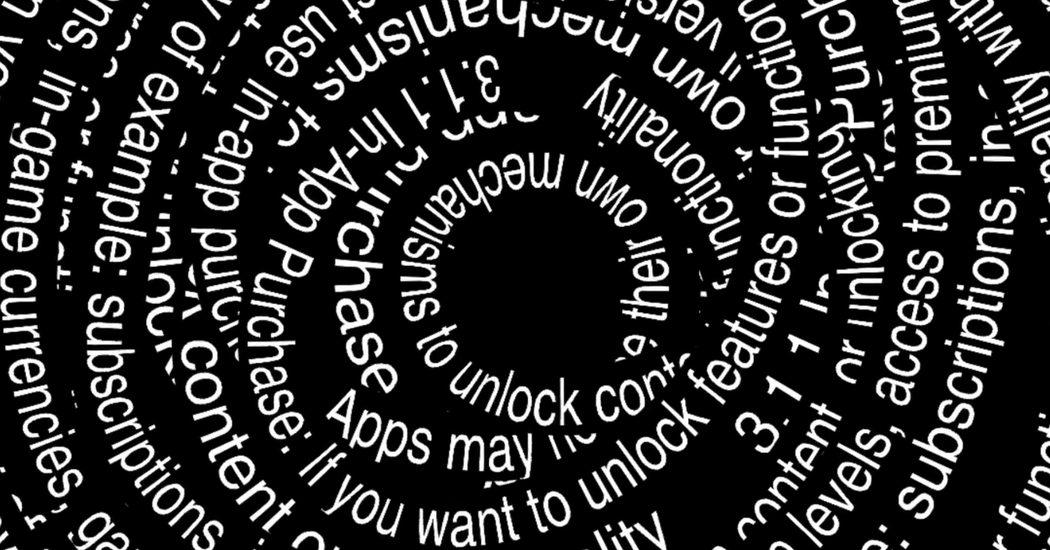Apps have become a huge economy, but the rules that apply to them are almost impossible to understand.
Apple and Google have twisted their decade-old rules for their app stores so much that they may no longer make sense. This has made buying digital stuff in apps so complicated.
An example: In theory, though not yet in reality, you can use your Amazon account to buy an eBook through Kindle’s iPhone app. You cannot buy an e-book in the Android version of the app. Until recently, Kindle purchases were basically a no-go under Apple’s rules, but fine under Google’s. Now it’s the opposite.
Confusing? Yes. Apple and Google have written long, complicated guidelines for apps and have regularly revised those rules to protect their own interests. (I noted earlier that Apple’s app rules are much longer than the US Constitution.)
Want more zaniness? Today, it’s easy to pay to subscribe to a podcast in Patreon’s iPhone app. Apple stands aside and allows Patreon to take your personal information and credit card information.
But buying other types of digital subscriptions can be very different. In the iPhone app, when you purchase a platinum membership to the Tinder dating service, you are essentially signing up with Apple and Tinder is on the sidelines.
Apple will take a portion of that membership fee forever. If you want to quit, tell Apple, not Tinder.
Buying a six-month membership through the Tinder app costs some people $14.99 a month, but it’s $13.50 if purchased through the website. (The price difference is how Tinder partially recoups the up to 30 percent fee it pays Apple for each app purchase.) Oh, and paying to use dating apps could soon work more than paying for stuff in Patreon — but only in the Netherlands.
For now, paying for Tinder through the Android app is more like how Patreon works. But that’s only because Match Group, Tinder’s parent company, has sued Google to prevent the company from changing its rules.
{DEEP BREATH.}
I might bore you with details about why Apple makes a distinction between buying a subscription from Patreon and buying a subscription to Tinder. There’s a logic behind why you can buy a paperback copy of “1984” of Amazon’s Android app, but not the ebook edition, and why new Netflix subscribers used to be able to sign up through the Android app, but not now. Or, kind of can’t. It’s another pretzel.
It took me hours of phone calls and detective work to find out all the details in the paragraphs you just read. With so many rules, exceptions, and explanations required to buy things from an app in 2022, the logic of the app economy might be illogical.
For years, some companies that make apps have complained about how Google and especially Apple control many aspects of this economy. They both dictate which apps we can easily download from their app stores and when they make purchases directly that we make through apps.
When we use an app to buy things that exist in the real world, like an Uber ride or a meal plan, those purchases bypass Apple and Google. The battle is about buying things that we use digitally, such as a trinket used in a smartphone app game or a subscription to a dating app.
The problem is, differences that made sense when Apple created its app storefront in 2008 don’t necessarily fit into the modern digital economy.
I’ve written before about YouTube creators who don’t understand why Apple or Google are entitled to some of the money — possibly forever — that their fans pay them through an app.
In the Zoom-everything era, does it make sense to have different rules, as Apple wanted, for example buying gym classes to take in person and those you take virtually at home? Why aren’t apps like Facebook that monetize through ads handed over a portion of the revenue to Apple and Google, but apps that sell digital subscriptions do?
And the app rules change often, adding more complexity.
This month, Google introduced tougher restrictions so that it must handle purchases of more digital stuff in apps and cut spending.
Again, there’s a feeling behind all these pretzel twists. Apple and Google want to prevent major smartphone video games, the biggest money makers in app worlds, from circumventing their regulations and fees. And they say they try to respond to complaints that they have too much control or that they are taxing small businesses.
But the more concessions Apple or Google make to silence angry governments and some angry developers, but not others, the more arbitrary their app store logic can seem.
Before we go…
-
Mark Zuckerberg once said securing elections was his company’s top priority. My colleagues Sheera Frenkel and Cecilia Kang report that Meta has now shifted his focus, but the risks of false online election information remain.
-
This is stupid: Reuters spoke to students who were accepting jobs from tech companies like Twitter, Coinbase and Bolt — only to pull those job openings when the companies were going through a rough patch. One recent high school graduate said she may have been forced to leave the US because her job was snatched.
Previously from On Tech: Hiring tech is still insane†
-
Ultra-wide-shot selfies that make people look distorted are totally cool. That writes a certified young person, my colleague Kalley Huang.
Hug for this
Octopus babies that develop inside their eggs are creepy and awesome†

